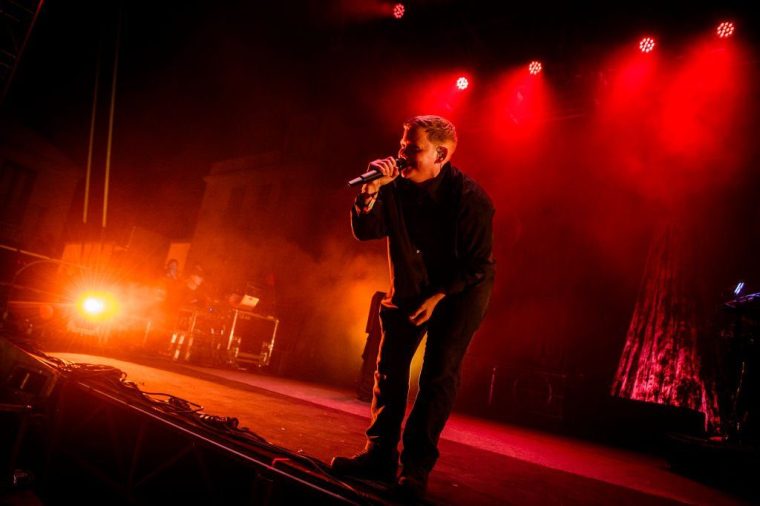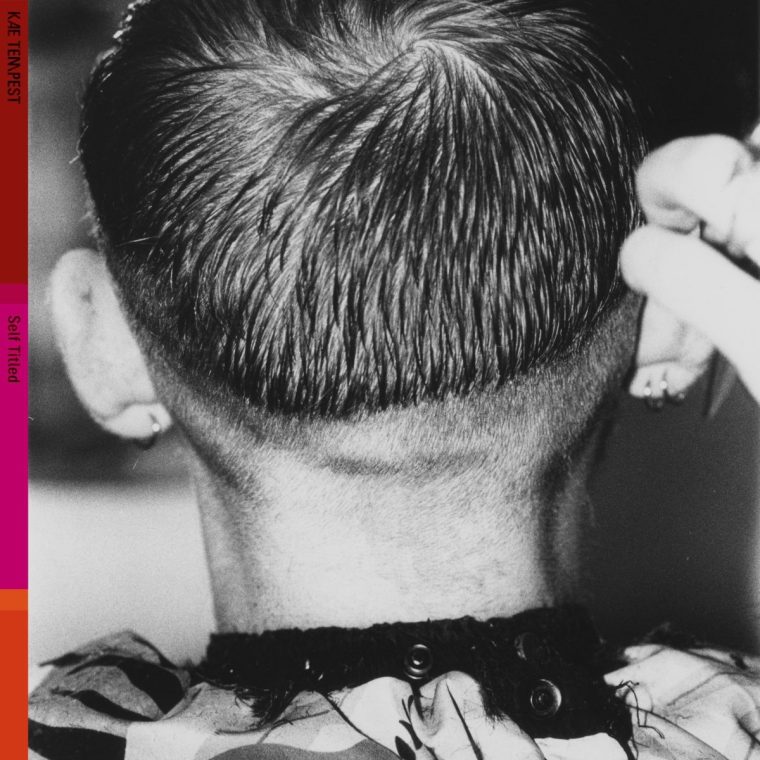The artist sitting opposite me on a corner-office couch in his record company’s HQ is slouchy, sprawled, relaxed. Kae Tempest is dressed in black, shirt loose but buttoned-up, the only pops of colour are his crayon-red Wallabee shoes and rusty-orange facial hair. The one thing more chill this sweltering day is Murphy, the musician’s 13-year-old Husky-Malamute cross, who was panting and prone on the carpet – alert only to his master’s voice – when I arrived.
To be fair, that’s a voice that commands attention, as powerfully demonstrated on Tempest’s new record Self Titled – an entirely different vibration to the scene several floors high in London’s Kings Cross this afternoon. It’s an album that comes at the listener in a rushing clatter, a torrent of rhymes and bars spat with joy, urgency, anger, vigour – and what feels, at several moments, like relief.
“Either I’m nice on the eye or this person that’s passing me by has never seen one like me before,” begins the first single, “Statue in the Square”, released in March, over heavy, plunging piano chords. “They never wanted people like me round here… / They used to tell their children not to stare…. / They can shake their heads in despair / but we’ve been here from the start and we ain’t going nowhere.” And the chorus: “But when I’m dead, they’ll put my statue in the square.”

Then there’s the album’s opening track, “I Stand on the Line”, which challenges, early on in a powerful, 77-line proclamation of intent: “Why are trans bodies always on the agenda?” It’s a strings-driven overture that’s giving euphoria despite the dysphoria it touches on (and that is directly referenced in another track, “Diagnoses”): “37, going through a second puberty / Out in the limelight like, please nobody look at me / I’m looking for myself, all I’m seeing is the bitterness / coming my way when I’m using the facilities / And how many strangers will I upset today with my existence?”
Publicly at least, Tempest began going by male pronouns within the past year. Around his last album, 2022’s The Line Is a Curve, Tempest was using they/them, a change that had been announced by the artist in 2020. (“I was assigned female, understood and socialised as female,” Tempest said in a podcast interview with Annie MacManus in 2023. “I thought myself to be a girl. I was trying to be a girl – I was trying.”) Now, on “I Stand on the Line”, he sings of how “the T’s putting hairs on my chest, spots on my chin / my emotions are not what they’ve been”.
When I mention those lyrics, Tempest says: “Once you’ve been through something like I’ve just been going through, it gives you a bit of a different perspective on… ah… just on every day.”
Not for nothing, clearly, is the rapper, poet, musician, playwright and novelist’s brilliant fifth studio album named Self Titled. Lyrically it’s wars’n’warts’n’all, as honest as it is bruised as it is jubilant. It’s an open-hearted, soul-deep approach for which Tempest credits his producer-collaborator, Fraser T Smith, the Grammy-winning hitmaker and producer for Kano, Adele, Dave and more. Epic in ambition, big on tunes and blasting all the feels – and with four “secret” guest stars – the album is a triumph.
“Fraser’s encouragement was to tell my own story,” begins Tempest. “He said: ‘What other lyricists in the UK working right now can tell your story the way you can? Nobody. So tell it.’”

To encourage the 39-year-old South Londoner further as the pair embarked on the project in Smith’s well-appointed studio in the Buckinghamshire countryside, he told Tempest about the process of working with Stormzy on his 2017 debut Gang Signs & Prayers. As Tempest recounts it: “When Stormz [sic] was making that record, what was expected of him was an album of punchy street bangers, basically. He could have very easily done that. But what he wanted to do was a bit harder. He wanted to show the facets of his selfhood that were not so sellable or acceptable in the mainstream imagination. He wanted to write about the fullness of his selfhood.”
For Stormzy, that meant songs about faith and devotion to his mother. “So he put himself in a place of vulnerability,” continues Tempest. “And because he did that, the album resonated more fully and more widely with people. Once Fraser had given me that example, I understood it in terms of getting the best out of the songs.”
That said, they took a minute to get there. Tempest admits he’d initially gone to Smith with demos for a different set of songs. “And Fraser was like: ‘This isn’t right for you right now. This isn’t where you’re at.’”
What, I later ask Smith, did he mean by that?
“I got the feeling that Kae wanted and needed to write a very autobiographical record,” remembers the producer, who first worked with Tempest when he tapped him to contribute vocals and lyrics to “We Were We Still Are”, a 2023 track by Smith’s all-star Future Utopia project. “The first thing that jumped out was that quite a lot of those songs were third person. There was a concept behind that record that was very clever, but I felt that this was the time where Kae needed to put his heart on the line and be brutally honest about his journey up to this point as an artist.”

In his own words, he didn’t hold back with his opinions. It was a situation he’s had with “numerous artists – you speak your truth and half expect the artist to punch you in the face and storm off. But in this case, Kae listened.”
Tempest’s flow has rarely been better, more biting. With lines like “It’s not a disorder or a dysfunction / disgusting the way they discuss us”, I ask if it’s fair to view the song as foreshadowing spring’s Supreme Court Ruling, the month after the song’s release, that the legal definition of a woman is based on biological sex.
“Yeah…” says Tempest. This normally forthright speaker is now uncertain and quieter. “I mean… Painful, that…” Rubbing his eyes and looking actually pained, he stares at the ceiling. “It’s a celebration, that song. The whole album has a celebratory spirit to it. Not to shy away from the conditions that we’re celebrating within,” he adds with a sandpaper-dry laugh. “But that song hopefully will feel resonant and rousing for those of us who need a bit of that right now.”
I ask whether writing as “him” has affected how he writes.
“Um… Well, I think my writing has always been the space I go to retreat or to recover from the pain of existence, life, my body in this world and the stuff that was, yeah, really difficult. The part of me that went to writing, creativity, lyricism, music – I still felt that was my true essence, and it lived there.
“The difference is now I can actually exist in my body as well as in my imagination. Now I can actualise. It doesn’t hurt to be sitting in a room!” He gives what sounds like a relieved gulp of laughter.
Tempest, and the marketing around Self Titled, are equally circumspect about the guest vocalists on the album. Neither credited nor advertised on any promotional materials, they’re an impressive crew: Annie Lennox, Neil Tennant, Connie Constance, Young Fathers. Nobody, it seems, wants anything to overshadow the core message, and core voice. Certainly, for the beautiful, soulful trip-hop of “Prayers to Whisper”, an elegy for someone dear whom Tempest lost (he won’t say who), Los Angeles-based Lennox recorded her contribution with some restraint.
“She didn’t want her huge stardom to impede the life of the track,” suggests Tempest. “She’s such a huge presence, so I think she was really trying to hold back.” That said, “I just wanted her to let loose,” he admits with a smile. “But I also didn’t feel like I wanted to give Annie Lennox any instruction about what she should do in the studio!”
“Kae’s usage of words is so uniquely emotive – I’ve never encountered anything like it,” Lennox tells me. “We agreed that ‘Prayers to Whisper’ would be a great track to work on… I actually ‘lived’ with the track for weeks in my head, as it’s so intriguing and compelling. I have a little studio here and set to work, recording a load of vocal ideas… I was absolutely delighted and in my happy place in trying to create complimentary ideas to this deeply moving piece of work.”
As for Tennant, who sings on the glorious, clubby “Sunshine on Catford”: “Fraser had been encouraging me to be ambitious. So we were just listening to the track [in the studio] and he was like: ‘Wouldn’t it be cool if we had Neil Tennant on this hook?’ I was like: ‘F*ck yeah, that’d be amazing!’”
A couple of calls later, Tennant was in. “He loved the song, and he just sent back his vocal. It was so fluent. It feels like a blessing from a fairy godfather: ‘Off you go.”
All of which feels very fresh, very Tempest, very now. Given the lyrics about personal discovery and his journey over the past couple of years – and given the prolific nature of his art (he’s just submitted a “copy edit” draft of a new novel for publication next April) – I ask if this most astute of observers has written anything in response to the Supreme Court decision. Tempest replies that that’s “not how I really operate”. Smith, though, can see the socio-political importance – that urgency – of Tempest’s words.
“It’s unashamed. Kae’s lyrics are incredibly sentient [sic] to our times. He’s not gone out to be this but he’s becoming this figurehead of the community – who stands like this statue in his own humble, unassuming way. He’s speaking the truth to so many people who feel downtrodden and marginalised and forgotten and hated.”
Does Tempest, then, see how his new songs will inspire and reassure, embrace and encourage, those who feel embattled and besieged by that ruling and the JK Rowlings of this world?
“Yeah. Of course. But I feel more confident and comfortable expressing myself, or showing up in that way for my community, in that way,” he says, meaning: it’s all there in the lyrics and not – in today’s specific circumstances at least – for discussion.
“With all due respect,” he says, looking at me intently and placing his palm above his heart, “I don’t want to talk about issues directly affecting my community to a cis person who’s then gonna filter through the things I’ve said and write, in your own words, a message that I might have to my community in a time where it’s so dangerous and difficult.
“It just doesn’t feel right to me – with love and with respect,” he repeats. “But I have another platform where I can speak directly to my community. There’s less risk there for being manipulated, used.”
Which is entirely right and reasonable. Listen to Self Titled and hear Kae Tempest’s trenchant poeticism – unmediated and celebratory and all him.
Self Titled is out now
